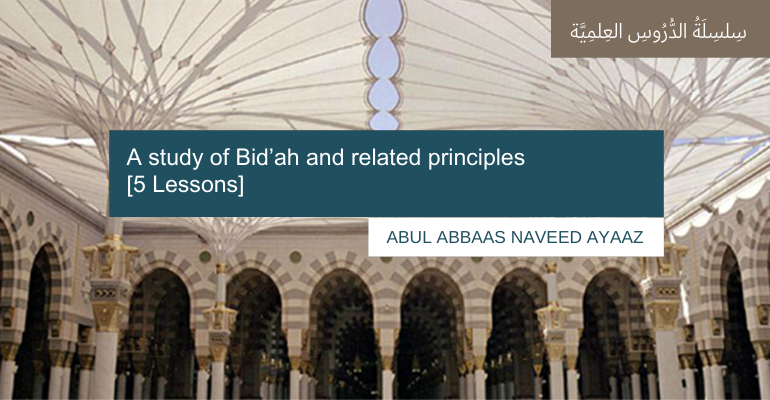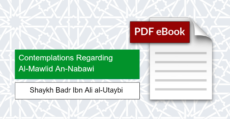A four part series of lessons in which the definitions, categorisations, rulings, principles and doubts and matters relating to Bid’ah (religious innovations) are studied.
Lesson One: Download Lesson 1
In this lesson you will learn:
- The linguistic and Islamic definition of Bid’ah;
- The difference between worldly and religious innovations;
- When does a Bid’ah take a person out of the fold of Islam;
- What is the difference between an absolute Bid’ah and a relative Bid’ah;
- Understanding the statement of Umar: “How good a Bid’ah this action is…”;
- When not doing an action is also considered to be a Bid’ah;
- Are the dots and vowels in the Qur’an considered to be innovations?
Lesson Two: Download Lesson 2
In this lesson you will learn:
- Why Bid’ah is more severe than personal sins;
- Can we categorise Bid’ah into good and bad?
- Six characteristics of an action to be fulfilled, otherwise it is a Bid’ah;
- The famous narration of Imaam Malik regarding innovating actions with a good intention.
Lesson Three: Download Lesson 3
In this lesson you will learn:
- Ayaat, Ahaadeeth and statements of the Salaf regardng Bid’ah;
- The difference between Masaalih Mursalah (considerations of public interest) and Bid’ah;
- The story of how, when and why the Islamic Hijri year was introduced – and why it is not a Bid’ah;
- Separate rooms for women, minarets, Mihraab and lines for prayer rows – are such actions Bid’ah?
- Is everybody who does a Bid’ah labelled as a Mubtadi’ (innovator);
- Statements of Ibn Taymiyyah, al-Albaani, Ibn Uthaymeen regarding the label Mubtadi’;
- A mention of An-Nawawi and Ibn Hajr;
- The incorrect Manhaj of forcing people to adopt a stance based upon the ijtihaad of a particular scholar.
Lesson Four: Download Lesson 4
In this lesson you will learn:
- Guidelines and principles in expelling a person from the fold of Ahlus Sunnah;
- When is a Sunni excused for a mistake, and when is he judged to be from Ahl Al-Bid’ah;
- The principle of Ahlus Sunnah: Self rectification precedes rectification of others.
Lesson Five [Last Lesson]: Download Lesson 5
In this lesson you will learn:
- Guidelines and principles in boycotting the people of innovations and disobedience.
- The wisdom of the Prophet (sal Allaahu alayhi wa sallam) in why he boycotted some people and kept relations with others.
- The obligation of loving and hating for the sake of Allah.
- A comprehensive clarification by Shaykh Ibn Baz regarding boycotting the people of innovation.







I really understand